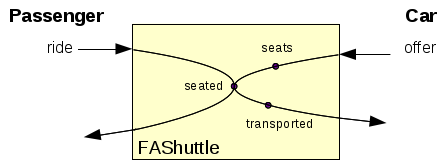Parallel Programming WS 2014/2015 - Assignment 4
Kastens, PfahlerInstitut für Informatik, Fakultät für Elektrotechnik, Informatik und Mathematik, Universität Paderborn
Dec 08, 2014
Exercise 1 (Rendezvous: The Fürstenallee Shuttle)
A new driverless shuttle train connects the Fürstenallee building with the University campus. It consists of a single rail car with seats for 8 passengers. The shuttle only starts if the car is fully occupied.
We apply the design method for the rendezvous of processes to design a monitor for the FA shuttle simulation. The following illustration shows the entry procedures and the counter variables:

- a)
- Determine the monitor invariant.
- b)
- Determine the waiting conditions and the counter increments
(Slide 36). Fill in the following table:
Entry Procedure wait while ... Modify counters ride offer - c)
- Substitute the increasing counters by limited counters.
- d)
- LAB:
Implement a Java monitor class that can be used with the FA shuttle
simulation in directory
blatt4/FAShuttle.
Exercise 2 (Barrier Synchronization: Rolling Dices)
We use N dices to generate endless sequences of random numbers:
public class DiceTest {
final static int N = 4;
public static void main(String[] args) {
DiceBarrier x = new DiceBarrier(N);
for (int i = 1; i <= N; i++) {
new Dice(i, x).start();
}
}
}
|

|
The results of each round have to be added and output. Therefore the dices have to be synchronized using a barrier after each throw:
public class Dice extends Thread {
private DiceBarrier x;
private int number;
private int val;
public Dice(int number, DiceBarrier x) {
this.number = number;
this.x = x;
}
public void run() {
while (true) {
val = (int) (Math.random() * 6) + 1;
x.barrier(number, val);
}
}
}
Use a simple shared counter barrier (Slide 44) to
complete the implementation (blatt4/dices) of class
DiceBarrier:
public class DiceBarrier {
private final int N; // number of dices
DiceBarrier(int n) {
N = n;
}
synchronized public void barrier(int dicenumber, int value) {
// to be completed
}
}
Hint: The barrier method is also responsible for computing the sum
of the dice values.
The dicenumber parameter
can be used to generate log output like:
Dice 4 arrived Dice 2 arrived Dice 3 arrived Dice 1 arrived Sum = 15 Dice 1 arrived Dice 4 arrived Dice 2 arrived Dice 3 arrived Sum = 17 ...
Generiert mit Camelot | Probleme mit Camelot? | Geändert am: 05.01.2015


